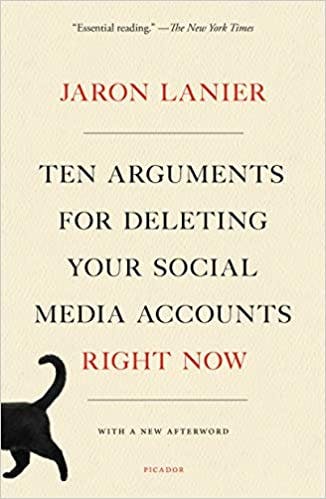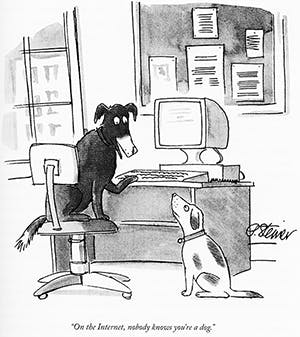books
In defense of being an asshole

Jaron Lanier claims that I’m an asshole. I’m part of an asshole machine and I’m assisting in the production of little baby assholes. Chances are that you are too.
It’s quite offensive to think of yourself as an a-hole. After all, my friends consider me a pretty nice person. While I’m far from perfect, I do my best to be ok with other people. So why would this stranger start calling me names?
The context is his book and theory about deleting one's social media accounts. Lanier is upset about social networks and gives some compelling arguments for bailing out.
While he brings quite a few good points, I think it's fair to say that there is one thing that unites and glues his theory together.
Social networks modify the user's behavior in the interest of making money out of you, at all costs.
They do it in different ways and employ some psychological tricks to make it happen. Basically, you need to remember that as a user of Facebook and Twitter (or Google) you are not the client. You are the product. Your data and focus are rented to the highest bidder at any given moment.
Lanier coins an acronym that he uses constantly throughout the book. BUMMER is Behaviors of Users Modified and Made into Empires for Rent.
As intelligent readers, I'm sure you were all thinking this before. Yeah, yeah, social networks are intrinsically bad, they steal my privacy, make money off my back and allow the Russians to undercut democratic processes in the USA and elsewhere.
According to Lanier, this is just scratching the surface.
One can describe the evil process as such:
The internet in general, and certain aspects of Social Networking specifically, bring good to the world. They allow the best flow of information since the emergence of humankind, unprecedented means of communication, and a feeling of belonging and support that wasn't ever available for minority groups.
However, as (almost) everything in social networks is free (as in Free Beer!), Social networks had to find a different model to make money. That's you, the users. You are being constantly sold or rented.
Behavior modification techniques are used all the time on you. By using the "feed" or anywhere that social networks have a presence (and they do, on almost any page on the internet), you are giving them clues about your thoughts, your mood, and your actions. What they show you next on the feed changes on the basis of this data. You are being manipulated all the time.
You are being taken advantage of, and you are not a part of this party. You are the buffet.
Large corporations, foreign agents, political parties, ideology-driven players of different kinds buy the right to enter the party and hypnotize you.
Nothing you see in your feed is there for your benefit. It's there because it's part of an algorithm that has two goals:
- To keep you coming (or prevent you from ever leaving)
- To make money off of you
They keep you coming by using an ever-changing combination of visuals that extract different emotions from you. They make you happy, sad, furious, excited and most importantly, they make you take sides. They put you into groups that force you into the playing field of the identity politics game. Vegans vs. carnivores, conservatives, and progressives, anti-vaxxers vs. the world. You have to take sides, and once the networks identify your soft spots they will make every effort in the book to make you angry, to make you shout, to make you excited, to go to the extremes.
They use mechanisms like likes, comments, and follower and friend counts to make you work your ass off to build more social network clout. "Oh, Jerry has gotten 250 likes for his post, and I got 5. Perhaps I should be a little more extreme in my next post". And, whoops, I'm already a tiny bit more asshole than I was 5 seconds ago. Now, repeat this process an infinite amount of times.
To make money off you, social networks manipulate you to buy stuff, do stuff, or think stuff.
Amazingly, social networks even brag that they can do so. Facebook has contested that they can play with people's emotions, and advertisers and content players on the platforms are taking advantage of that.
One of the best examples is the exploitation of Black Lives Matter and color tension in the US by foreign entities. According to Lanier, unidentified actors used the BLM protest to create so much despair and tension among the color community in the US that they actually managed to lower voter participation in the 2016 elections.
It was already happening anyhow, that's true. Black Twitter was outraged (rightfully, if you ask me) following certain events that took place (and are still taking place) in the country. However, non-authentic twitter accounts (fakes, bots) raised the tension to a whole new level.
It was a plot that everybody gained from except the social network's users who were outraged and falsely became more extreme, and Hillary Clinton, who lost the elections. Twitter, like other social networks, profits from more tension, from toxicity, from heated debates. It causes users to increase their network presence, to become more vested in the network, to take sides. Well, two other winners were Donald Trump and whoever created these accounts in the first place, perhaps the Russians or someone else with ill intentions about the American democratic process.
Here's the interesting part for me and Lanier touches that point briefly throughout the book. It's not that someone specific is trying to do wrong with you. There is no reason on earth to think, for example, that Facebook or Twitter chiefs would want Donald Trump to rise to power. They are, for the most part, progressive liberals that want the exact opposite.
It's not them. It's the machine. It's the structure.

It was already in 1993, that Peter Steiner published his now-famous cartoon "On the Internet, nobody knows you're a dog". The underlying misconception behind the cartoon is the big enabler for social network activity. You think that nobody knows what you are doing, and frankly, no person does. But machines do.
You are tracked all the time. You are giving signals all the time. And you are manipulated based on those signals.
Lanier's conclusion, which he acted on himself, is to quit social media altogether.
I think his suggestion is irrelevant to most of us. Unless you belong to a privileged group that doesn't need social media for communication, self-promotion or work, it will hurt you. There will be severe implications for quitting.
You will be left, in some respects, out of the loop.
You will be ignorant, in some ways, of the things your peers are exposed to and affected by.
You will have fewer tools to survive in an age where social media is part of work.
However, there are 2 things you can do:
- Be aware of everything that's going on. You are being tracked, you are being manipulated, you are being coerced to addiction. Knowing that, and talking about it, and thinking about it, helps. You regain parts of your free will by understanding, at least in part, the forces that are put on you.
- Use social media a bit less. Give the BUMMER machine a bit less data. If you want, you can even supply it with false signals (just click here and there on random ads, open random articles in your feed, and so on) or less signals. There are extensions, plugins, software, and behaviors that can help you remain a little bit more incognito.
As for the asshole accusation, well, Lanier is probably right. Being forced to look at likes and follow counts and work around people with higher counts of whatever, makes me a bit of an asshole. Even here, using the word asshole is only partly justified - it's a quote from the book but also a bit of a provocation for my readers. Being aware of asshole tendencies is a good step to decrease assholeness.
It's a fascinating book with some intriguing and thought provoking arguments. By no means, it summarizes everything to say about the subject and it's quite one-sided. It feels at times like a long, well researched, blog post rather than a research book. It's a great two-hour read that will help you become a better internet citizen, a better user, maybe even a bit less of an asshole.